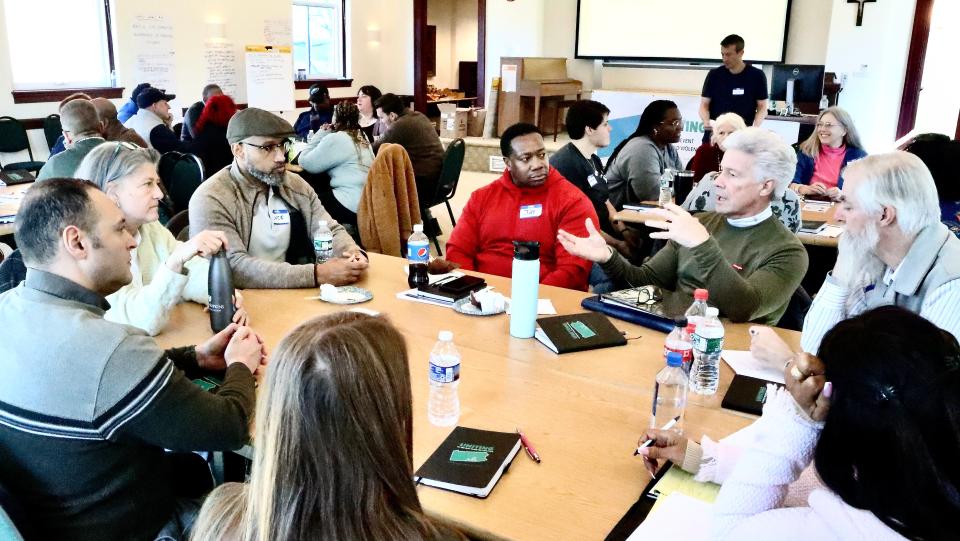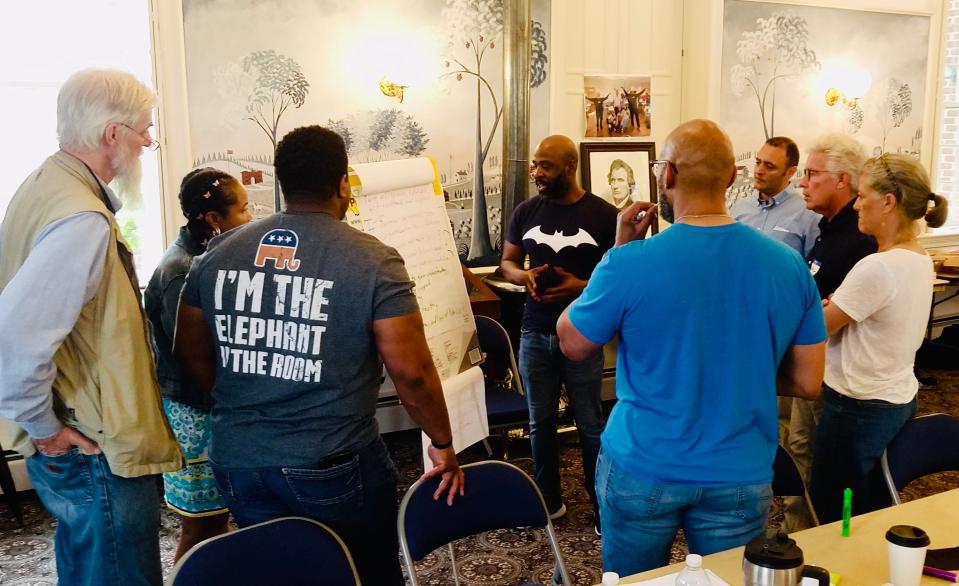The country is divided. This organization is building bridges, one community at a time
Few would argue these days that there's an "us" and "them" division pervading the nation, from Congress to neighborhoods to even friends and families.
And few would argue that's a good thing.
Can American society be brought back from the brink?
Nationally, groups have been springing up with a mission to build bridges across the many divides and foster a new sense of community and cooperation — and just get people talking to each other again.
One in particular has taken on business and economic cooperation in Maryland, and the prevention of targeted violence in south-central Pennsylvania.
It's called Urban Rural Action, and it exists to bring people together — building relationships for seeking solutions for community challenges.
MSP investigating fatal crash: Maryland State Police investigating fatal truck crash in northwest Frederick County
What does Urban Rural Action do?

Founder and Executive Director Joe Bubman's background is in international peace-building, having served with Mercy Corps before founding Urban Rural Action. Through his affiliation with Vantage Partners, he conducts negotiation workshops for Fortune 500 companies and the Air Force.
He was involved with nongovernmental organizations "doing work in conflict zones around the world to try to do exactly what we're doing in this country now, which is to bring the people on the ground on different sides of the issue together, to tip the table, to try to make progress on whatever the issue is," said Kira Hamman, a longtime mathematics professor at Penn State—Mont Alto who now serves as UR Action program director.
After the 2016 election, she said, he "saw some of those same conflict dynamics that are the hallmarks of those international conflicts playing out in this country … and so he pivoted and started this organization."
Its programming began in 2019, Hamman said, with funding that comes from a variety of sources, inclulding grants. A grant from the Department of Homeland Security, for example, pays for the Pennsylvania project. The organization also receives donations and earns revenues from programs on college campuses and customized worships for individual clients.
One of its previous projects involved Washington County Chamber of Commerce President Paul Frey, who now serves on the UR Action board.
"I worked on a work-group for immigrant business owners in Easton (Md.), Frey said, where language and cultural barriers were hindering their success.
"What we found is there are resources available for any businesses, but many immigrant business owners didn't know how to access them, or didn't have connections to access them," Frey said. "Our goal is to help immigrant business owners, who may not have the connections, to work with the business community to be more successful … And what we found was there was a divide; it was mainly around language."
That made it difficult for immigrant owners to connect with others in the business community to get the help they needed, he said. "And so through our work, we made those connections and made relationships, and found that if we can help business owners be successful, it helps the economy. And they win, and the local economy wins."
There were biases to overcome, Frey said, as business owners tried to understand each other's perspectives. The UR Action team encouraged one business owner, who spoke "very little English," to learn more English to be successful — and encouraged English-speaking business owners to "hop over the fence a little" and learn some Spanish.
"It's really about relationships," he said. "We have similar goals; sometimes we don't talk about them, and then the collaboration doesn't happen. Then it's lose-lose versus winning."
Hamman said the program was so successful that UR Action is replicating it elsewhere.
Prison fight case update: Last defendant sentenced from 2022 prison-yard fight with Maryland correctional officers
Checking violence in Pennsylvania

Bubman and Hamman currently co-direct a program aimed at preventing targeted violence in Franklin, Adams, York and Dauphin counties in south-central Pennsylvania. The program began in 2022 and runs through September — but an offshoot of the program that focuses on election-related violence continues through the rest of the year.
But why south-central Pennsylvania?
"That is a very polarized area politically, but the truth is that targeted violence can happen anywhere," Hamman said. "And almost by definition, you're not expecting it. You don't see it coming. And so it's not so much that that area is particularly high risk for for targeted violence, as that everywhere is at risk for targeted violence."
But there was no major framework in the area for preventing such violence, she said, and the UR Action "uniters" have "made a lot of progress. … they have some amazing stuff going on. But because it's a fairly polarized area, it's a good fit for us to come in and bring people together to think about this issue that's a critical issue everywhere."
UR Action is running a similar program in the Kenosha area of southeastern Wisconsin, which did experience violence in 2020 — "so that's been a little bit different situation," Hamman said. "But it's a concern everywhere. And so our hope is to avoid having it actually happening in that area."
Participants are learning the warning signs of potential violence.
"People don't just snap," Hamman said. "There's lots and lots of warning signs. And so if you can teach the community to recognize the warning signs, and you have in place systems — reporting structures but also support structures to intervene when people are on that pathway, then you can often, maybe even usually, can get them off the pathway.
"It's not inevitable that they're going to commit an act of targeted violence."
UR Action's program includes support for threat and management teams, which Hamman said "are these multidisciplinary teams have K-12 education, mental health, support services for all sorts of different individual populations, whether that's unhoused people or veterans or people in recovery, all these sorts of organizations as well as law enforcement.
"To get those people talking to each other, so that when a when a person of concern is identified, there's lots of options. It's highly contextualized … What's going on with that person? What do they need? And who can provide it? So that's what the threat assessment and management teams do."
Community members need to be aware of warning signs, she said, and know what to do if they recognize them.
"It's fine to recognize it," she said, "but if you don't have anything to do with that information, then it's no good." That's why developing those management teams is important.
But in a broader sense, a strong, cohesive community is itself a major protection from violence, Hamman said.
"If the community cohesion is really high, if the community is very resilient, then it's just much less likely that those things will happen," Hamman said, which is why UR Action is working with so many community organizations.
"The idea is that we strengthen the capacity of those organizations, and their reach, and their ability to take those kinds of referrals and funnel them into the right place," she said, "as well as just to prevent even getting to that point in the first place."
While UR Action's work on this project is set to wrap up in September, a secondary piece was launched for Franklin and Adams counties last week dealing specifically with preventing political violence around this year's election. That program will be in place through February.
How expensive is living in Hagerstown: Last defendant sentenced from 2022 prison-yard fight with Maryland correctional officers
Learning how to talk to each other is key
UR Action already has been involved on college campuses, promoting dialogue, relationships and peace-building. This fall, Hamman said, the organization will begin programs for K-12 education.
Key to all of these efforts, Frey said, is building relationships. Even those who are divided often have the same goals, he said.
"They may need an opportunity to discuss that dialogue; someone just being heard," he said. "Folks who might go to the other side of the fence, whatever that fence might be, have kids and a house, they want their kids to go to school, they want to raise their families, they have a lot in common. And then how do you bring the differences together and have a conversation?
"Focus on what you have in common."
Frey said he got involved with UR Action because of the collaboration aspect.
"I wanted to bring the business perspective in because I thought that's important," he said. "How do you balance the government intervention with free market? How do you do that, is why I got involved, because commerce is important.
"And frankly, how do you get a diverse group working together? … It's just critical."
That "used to happen on the playground; it used to happen at home and in the neighborhood," Frey said. But with the development of social media, people don't talk or interact so much, he said.
"It's something we used to learn on the playground, we used to learn from our parents, we used to learn from friends; and now there's less of that," Frey said. "You're hiding behind a computer screen or a smartphone with your opinion and not having face-to-face conversations."
"Our role is not to provide solutions," Hamman said. "Our role is to help communities work across divisions to find their own solution."
100-acre farm preserved: Washington County preserves 100-acre farm in Big Pool
Find out more about preventing violence in your community
UR Action is sponsoring a "regional prevention gathering" from 10 a.m. to 12:30 p.m. Aug. 24 at the Franklin County 11/30 Visitors Center in Chambersburg, Pa. It will include "uniters" from the Pennsylvania project and local officials discussing what they're doing to prevent targeted violence and provide opportunities to exchange ideas.
Interested? Register by Aug. 15 www.uraction.org/events.
This article originally appeared on The Herald-Mail: Urban Rural Action is building bridges in a divided America

